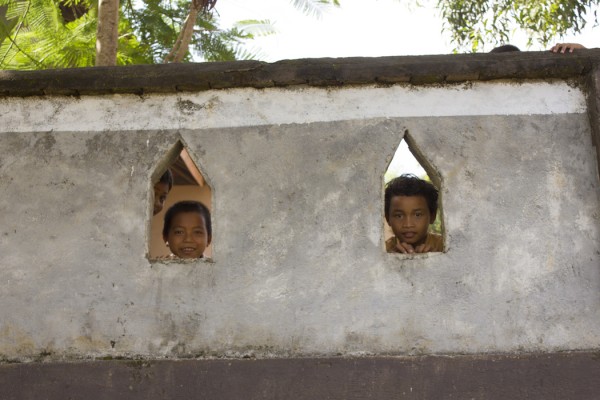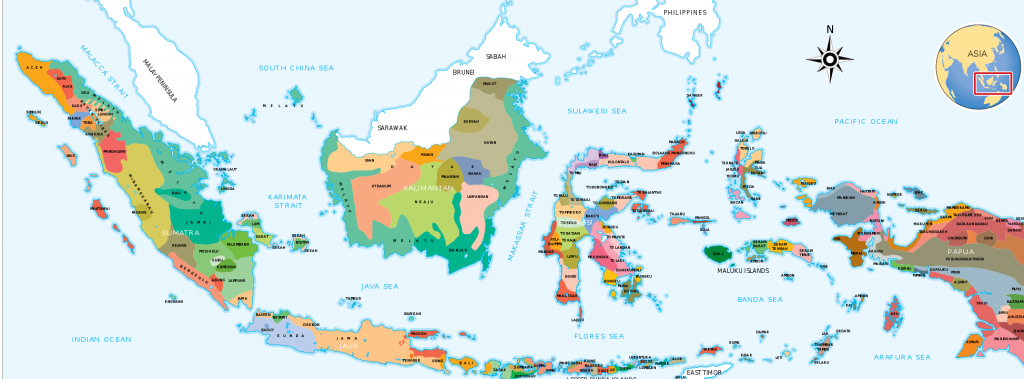Contents [hide]
In Bali, most of the young people in Kuta, Seminyak and Denpasar know some English. But venture to the north of Bali, or to neighboring Java, Lombok or Sumbawa, and you will need to know some basic Bahasa Indonesian words just to get by.
Besides, if you speak with the locals in Indonesian, they give a better price when bargaining because they understand that you are a savvy traveler. People that speak only English, or some other language, usually get the short end of the stick when it comes to prices.
It’s important to understand that Bahasa Indonesian is a relatively “new” and “made up” language. It was developed in the 1940s as a way to unify the country and to stir up nationalism in order to drive out the Dutch administrators.
All of the islands in Indonesia have their own vernacular that is spoken as the first language (such as Javanese, Balinese, Sumatran etc.) with Bahasa Indonesia spoken as the second language. It’s estimated that there are over 750 languages alive in Indonesia today. For extra brownie points, learn a few words in the native language of the island that you are in.
With that said, here are some important Bahasa Indonesian words to know when traveling.
Greetings in Bahasa Indonesia
Good morning = Selamat pagi (s’lah-mawt pag-jee)
Good day = Selamat siang (s’lah-mawt see-ung)
Good afternoon = Selamat sore (s’lah-mawt sore-eh)
Good night = Selamat malam (s’lah-mawt maw-lahm)
Good bye (to a person leaving) = Selamat Jalan (s’lah-mawt jah-lahn)
Good bye (if you are the person leaving) = Selamat tinggal (s’lah-mawt ting-gahl)
How are you? = Apa Kabar (up-ah kah-barr)
I’m great = baik baik (bike-bike)
Indonesian Pronouns
I = Saya (sigh-ah)
You = Anda (awn-da)
You (sir, to adult man) = Pak (puck)
You (madam, to adult women) = Ibu (ee-boo)
He/she = Dia (dee-ah)
We = kita (kee-tah)
Them/they = Mereka (ma-reck-ah)
Questions
Who? = Siapa? (see-up-ah)
What? = Apa? (up-ah)
When? = Kapan? (Kah-pahn)
Where? = Kemana? (k’mah-nah)
Why? = Kenapa? (k’nahp-ah)
How? = Bagaimana? (bug-eye-mah-nah)
How many? = Berapa? (burr-ah-pah)
How much is this? = Berapa ini? (burr-ah-pah in-ee)
How much is that? = Barapa itu? (burr-ah-pah-ee-too)
How long? (time) = Berapa lama? (burr-ah-pah lah-mah)
How far? = Berapa jauh? (burr-ah-pah jow-ooh)
Hold old? = Berapa umur? (burr-ah-pah oo-more)
Manners
Please (can I have?) = Minta (min-tah)
Please (help me) = Tolong (toe-long)
Thank you = Terima Kasih (teh-ree-mah kah-see)
You’re Welcome = Sama Sama (saw-ma saw-ma)
I’m Sorry = Saya minta ma’af (sigh-ah min-tah mah-uff)
Useful Indonesian Words
Good = Bagus (bah-goos)
Very good = Bagus sekali (bah-goos s’kahlee)
Not good = Tidak bagus (tee-duck bah-goos)
Fine = Baik (bike)
Yes = Ya (yaw)
No = Tidak (tee-duck)
Like = Suka (soo-kah)
Don’t Like = Tidak Suka (tee-duck soo-kah_)
I want = Mau (mao)
Don’t want (Tidak mau) (tee-duck mao)
Family
Family = Keluarga (k’loo-ah-ga)
Relative = Famili (fa-mee-lee)
Friend = Kawan (kah-wahn)
Lover = Kekasih (K’kah-see)
Married = Nikah (nik-ah)
Husband = Suami (Swah-mee)
Wife = Isteri (Is-t’ree)
Father = Bapak (Bah-puck)
Mother = Ibu (Ee-boo)
Grandmother = Nenek (neh-neck)
Grandfather = Kakek (kah-keck)
Son = Anak laki (ah-nuck lucky)
Daughter = Anak perempuan (ah-nuck purom-pwan)
Child = Anak (ah-nuck)
Older brother = Abang (ah-bahng)
Older sister = Kakak (kah=kak)
Younger sibling = Adik (ah-dick)
Uncle = Paman (pah-mahn)
Aunt = Bibi (bee-bee)
Cousin = Misan (mee-sahn)
Niece/Nephew = Keponakan (k’paw-nahk-ahn)
Numbers and Counting in Indonesian
0 = Nio (noy)
1 = Satu (sah-too)
2 = Dua (doo-ah)
3 = Tiga (tee-gah)
4 = Empat (um-putt)
5 = Lima (lee-mah)
6 = Enam (e-num)
7 = Tujuh (too-joo)
8 = Delapan (d’lup-un)
9 = Sembilan (sem-bee-lun)
10 = Sepuluh (seh-poo-loo)
11 = Sebelas (s’blahs)
12 = Dua belas (doo-ah b’lahs)
13 = Tiga belas (b’lahs)
14 = Empat belas(um-putt b’lahs)
15 = Lima belas (lee-mah b’lahs)
16 = Enam belas (e-num b’lahs)
17 = Tuju belas (too-joo b’lahs)
18 = Delepan belas (d’lup-un b’lahs)
19 = Sembilan belas (sem-bee-lun b’lahs)
20 = Dua puluh (doo-ah poo-looh)
21 = Dua puluh satu (doo-ah poo-looh)
22 = Dua puluh dua (doo-ah poo-look doo-ah)
23…
24…
30 = Tiga puluh
40 = Empat puluh
50…
60…
100 = Seratus (s’rahtoos)
1,000 = Seribu (s’ree-boo)
1,000,000 = Se juta (sir joota)
Balinese Words
Speak a few Balinese words to the locals in a warung and watch their smiles light up.
Sir (to a man older than you) = Pa (Paw)
Ma’am (to a woman older than you) = Me (May)
Older brother (term of endearment) = Beli (b’lee)
Older sister (term of endearment) = m’Bok (m’bok)
Younger brother = Gus (goos)
Younger sister = Geg (gek)
Thank you = Sukseme (sook-sah-Moor)
You’re welcome = Mowowli (moh-ow-lee)
Yes = Nggih (ny’gee)
No worries mate! – Sing Ken Ken (sin ken ken blee)


super helpful!!!